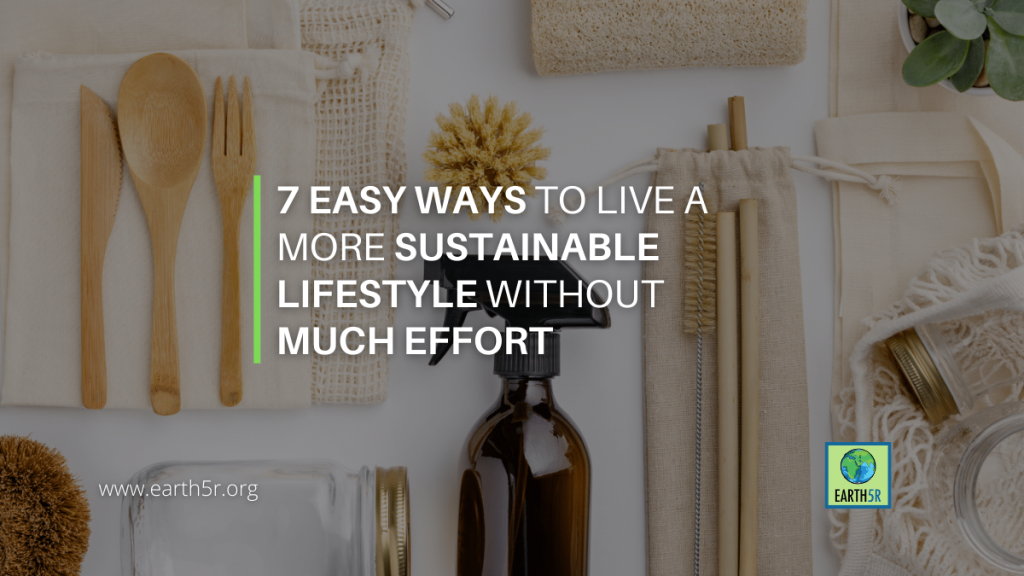7 EASY WAYS TO LIVE A MORE SUSTAINABLE LIFESTYLE WITHOUT MUCH EFFORT

Learn What Sustainable Living Means, Why It’s Essential, And How You Could Live A More Sustainable Lifestyle With Small Changes That Have Much Bigger Positive Impacts Than You Might Take Credit For.
Are you the type of person who wishes to make the world a better place, with less poverty, environmental impact, and food wastage?
If you answered yes, give yourself a tap on the back. You’re already halfway towards making this planet a healthier place for us all.
What Is Sustainable Living?
Unlike the hippies from the ’70s might have initially promoted, environmental sustainability doesn’t necessarily mean a life without luxuries.
Rather, it means being aware of your resource consumption and how to minimize unnecessary waste (be it of food, energy, water, or plastic, among others).
The truth is, every day, we make unconscious choices that affect the environment, the climate, and animals. From how many children we have to the effort of recycling and avoiding consuming more than we need… there’s a lot we can do to reduce our environmental footprint and our impact on the planet.
The Importance Of Sustainable Living
So now you know that the key to living sustainability is first to recognize that each action we take affects the world around us.
Granted, on the surface, it can be incredibly difficult to reduce your environmental impact — especially when you see that others around you are not doing their part. But when you break it down into easy action points, you realize you have more power than you ever imagined.
And every little bit counts.
Seemingly harmless objects such as bottle caps and straws can disrupt entire ecosystems (no wonder nowadays there are so many alternatives to plastic straws, for example).
In fact, simple purchase decisions such as avoiding buying bottled water to using a filter and a reusable bottle will greatly reduce your plastic waste.
Plus, you’ll soon notice that once it becomes a ritual, you’ll increase your awareness and start thinking about what else you can do.
(trust us, being sustainable can get really addictive — in a good way, of course).
How Can You Be More Sustainable In Your Day-To-Day
Sustainable living is a daily practice, and there are plenty of easy ways for you to become more eco-friendly instantly. In fact, you can start off small and build your sustainable lifestyle one change at a time.
With that in mind, here are some simple adjustments we can all make to leave the world a better place for future generations.
1. Reduce Your Water Usage
Conserving water means using our water supply wisely and responsibly. According to The United Nations world water development report, “only 2% of the Earth’s fresh supply of water is locked in icecaps and glaciers, while 97,5% of the earth’s water is saltwater”.
This might help you realize just how important it is to be conscious of your water wastage.
Here are a few tips on how to minimize your water wastage:
- Close the water faucet when washing the dishes and brushing your teeth (this Colgate commercial is a great example of how much water is wasted when we leave the faucet running while we brush our teeth)
- Check for leaks in pipes and toilets
- Only use the washing machine when it is full (this will also help with your energy consumption)
- Take shorter showers. Reduce your shower time and try to avoid baths when you can
2. Don’t Throw Away Food
Global food waste is a major problem with huge financial, social, and environmental costs. According to Food and Agriculture Organization (FAO) of the United Nations, an estimated 1.3 billion tonnes of food is wasted globally each year, one-third of all food produced for human consumption (that’s HUGE!).
Find below practical tips to avoid any further food waste from now on:
- If you have leftovers, don’t throw them away. Either freeze them or make a conscious effort to eat them before it goes bad.
- Freeze fruits and veggies before they rot.
- Don’t cook more than you will eat.
- Avoid buying food if you realize you’re throwing a lot away at the end of the month.
- Opt for longer-lasting products.
3. Grow Your Own Food
Growing your own fruit and vegetables guarantees you’re not using pesticides that contribute to water and air pollution. This will also help to reduce the carbon footprint used to transport produce to supermarkets.
Growing your own food is not only a healthier alternative to the world, but it is also a lot of fun. Here are some easy-to-grow vegetables you could plant in your garden.
4. Eat Less Meat.
If you still enjoy your weekend burgers and chicken barbecue, you don’t necessarily need to become a vegetarian.
The idea here is to reduce your meat consumption. According to Marion Nestle, an author and professor emeritus of nutrition, food studies, and public health at New York University, “People are very concerned about protein, but it’s a nonissue. It’s in grains; it’s in vegetables; it’s everywhere. It will find you.”
Here are some awesome ways to reduce meat consumption while maintaining a healthy level of protein intake:
- Only eat what you need and don’t over-indulge.
- Avoid buying more meat than you need, so it doesn’t go to waste.
- Turn to High-Protein Grains (Pasta Counts!)
- Embrace Nuts and Seeds
5. Say NO To Plastic
Plastic never goes away. Today billions of pounds of it can be found in swirling convergences making up about 40 percent of the world’s ocean surfaces.
What’s worse, thousands of innocent birds, fish, sea turtles, seals, and other marine animals are killed every year after ingesting plastic or getting tangled up in it.
You can start cutting down on your plastic waste in a few simple steps:
- Use reusable bags when you shop,
- Ditch single-use water bottles, bags, and straws
- Avoid products packaged in plastic whenever possible (e.g., select unwrapped produce at the grocery store, shop local, cut down on online shopping).
6. Drive Less, Drive Green.
Walk or ride a bike to your destination instead of driving if it’s close enough – it’s better for the environment and your health.
Using public transport is another good way to help reduce greenhouse gas emissions. Changing your driving habits can dramatically reduce your carbon footprint.
- Buy a bicycle and pedal your way around your city.
- Use public transportation whenever necessary for longer commutes (i.e., avoid using a car).
- Take the stairs over the elevator (this is also great for your heart health).
- Combine errands to make fewer trips.
7. Consider Sustainable Grocery Shopping.
Sustainable grocery shopping relates to how you buy goods and services, taking into consideration the most efficient and beneficial options for all the species and systems on the planet.
A sustainable shopper opts for products that will have the least negative impact on the planet, such as:
- Shopping locally from smaller vendors
- Avoiding buying new plastic bags every time you go grocery shopping (buy a grocery cart or a reusable grocery bag)
- No more bottled water (time to invest in a filter)
8. Hasta Luego, Fast Fashion!
The fashion industry is one of the main polluting industries in the world.
To lessen this industry’s impact on the planet, you could buy more of your clothes from second-hand shops and sustainable clothing outlets.
Here are some other easy ways to shop more sustainably:
- Invest in better-quality items that last longer.
- Buy second-hand clothes whenever possible.
- Support fashion brands that are ethical and eco-aware.
- Learn the basics of sewing to take care of your clothes instead of throwing them away because they have a small holes.
Start A More Sustainable Lifestyle Today With Simple Action Steps
Nearly every decision we make — from how we go to work, where we shop, what we consume, and which products we use to keep our home fresh and clean— is an opportunity to make a healthy choice for the planet.
Read this article carefully and make a conscious effort to comply with a few of these items every day. Better yet, make it a challenge to adhere to as many (if not all) of the items in this post.
These small, seemingly invisible actions you take are certain to have great sustainable impacts on the planet.
We’re all in this together.
To read more of such articles, please visit https://earth5r.org




